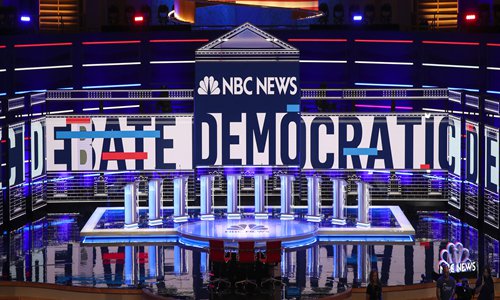HOME >> OPINION
US campaign portends tense ties with China
By Ling Shengli Source:Global Times Published: 2019/7/11 17:13:42

Photo: VCG
As the US 2020 election approaches, the Democratic Party has started its "vengeance." Who can defeat US President Donald Trump on behalf of the Democrats is tantalizing the public.
During the first Democratic presidential debate of the 2020 election in late June, 20 candidates made their debut. Foreign policy is normally not the focus of presidential primary debates, but in the context of the escalating strategic competition between Beijing and Washington, Democratic candidates' views on China are alarming.
The candidates mainly focused their attention on how to deal with China-US trade frictions, how to treat the "China threat," how to formulate a China strategy and so on. Given that most of the candidates have no diplomatic experience and that US domestic opinion is getting increasingly tough on China, the majority of Democratic candidates advocated a tougher stance toward China. This might indicate that whoever becomes the next US president, tensions between Beijing and Washington will continue.
Senator Bernie Sanders and Elizabeth Warren both support more tariffs on Chinese goods. As famous figures in the Democratic Party, as well as left-wing representatives, they believe in safeguarding US workers' interests by slapping tariffs on Chinese products. Even former vice president Joe Biden, also a Democratic candidate, who is relatively moderate on China-US trade frictions, has out of election pressure adjusted his previous China stance which was relatively soft.
Of course, there are also candidates opposing a China-US trade war. Amy Klobuchar from Minnesota and Kamala Harris from California both advocate properly dealing with trade issues with Beijing, instead of in extreme ways like a trade war, due to their states' close economic and trade ties with China.
Although these candidates' proposals over economic and trade disputes with China differ because of the different demands from their own states' voters, they generally believe that China needs to make some concessions. Nonetheless, when it comes to which measures to take, divergences are becoming obvious.
Democrats' opinion over the "China threat" basically focuses on economics. Over the years, the "China threat theory" has become a heated topic in US elections. Creating such a "threat" meets the need of US security strategies. Moreover, it can help US politicians shift the public blame on domestic woes to another country.
While the gap in economic strength between China and the US narrows, Americans' recognition of a "China threat" is getting stronger. There was a period when the term "Thucydides Trap" was popular. Yet generally speaking, Democratic candidates are mostly appealing for the "China threat" to be treated in a rational way, noting China has its own weaknesses in politics, economy and military. They believe it is not yet the right time to put China on an equal footing with the US.
However, thanks to the rapid development of China's economic power, which has affected the US economy and market, the "China threat theory" is more widely spread in the field of economics.
This is only the primary stage of the US election campaign, where foreign policy rarely plays a major role. In the months to come, presidential candidates might touch on the South China Sea issue, the Taiwan question and China's "military threat" more frequently.
From the perspective of stances of the Democratic candidates, there is an obvious uncertainty about what kind of strategy Washington should adopt over China in the future. Not long ago, 100 well-known China experts in the US jointly wrote an open letter to Trump, reminding him that "China is not an enemy" to avoid self-fulfilling prophecies.
It reflects that there is currently no common ground on China policy in the US. Americans hold diverse views on China. Even among Democratic candidates, there are those who adopt a tough stance and those who are moderate.
The problem is, US public opinion's tough tone against China may influence candidates, turning the idea of being tough against China into political correctness. This is dangerous.
There is no need to emphasize how important China is to the US. How Beijing-Washington ties will develop in the future is a major issue that US foreign strategists must properly manage, be it Republican or Democratic members. Trump's hawkish policy has already led to losses on both sides, which needs to be changed by Democratic candidates, who should treat China more rationally.
The author is secretary-general of the International Security Study Center at China Foreign Affairs University. opinion@globaltimes.com.cn
Posted in: VIEWPOINT